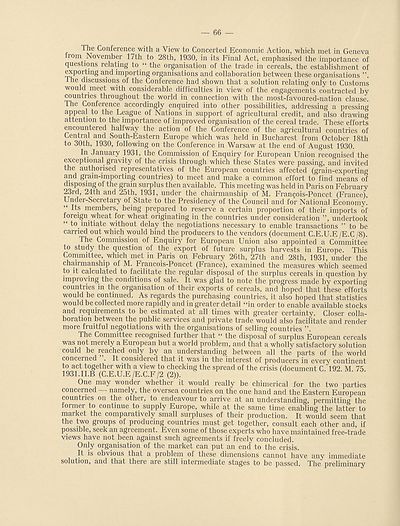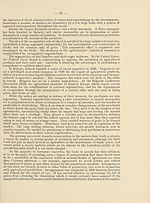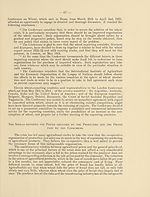Download files
Complete book:
Individual page:
Thumbnail gallery: Grid view | List view

— 66
fhe Conference with a View to Concerted Economic Action, which met in Geneva
it om November 17th to 28th, 1930, in its Final Act, emphasised the importance of
questions relating to “ the organisation of the trade in cereals, the establishment of
exporting and importing organisations and collaboration between these organisations
1 he discussions of the Conference had shown that a solution relating only to Customs
would meet with considerable difficulties in view of the engagements contracted by
countries throughout the world in connection with the most-favoured-nation clause.
The Conference accordingly enquired into other possibilities, addressing a pressing
appeal to the League of Nations in support of agricultural credit, and also drawing
attention to the importance of improved organisation of the cereal trade. These efforts
encountered halfway the action of the Conference of the agricultural countries of
Central and South-Eastern Europe which was held in Bucharest from October 18th
to 30th, 1930, following on the Conference in Warsaw at the end of August 1930.
In January 1931, the Commission of Enquiry for European Union recognised the
exceptional gravity of the crisis through which these States were passing, and invited
the authorised representatives of the European countries affected (grain-exporting
and grain-importing countries) to meet and make a common effort to find means of
disposing of the grain surplus then available. This meeting was held in Paris on February
23rd, 24th and 25th, 1931, under the chairmanship of M. Francyhs-Poncet (France)
Under-Secretary of State to the Presidency of the Council and for National Economy!
Its members, being prepared to reserve a certain proportion of their imports of
foreign wheat for wheat originating in the countries under consideration ”, undertook
“ to initiate without delay the negotiations necessary to enable transactions ” to be
carried out which would bind the producers to the vendors (document C.E.U.E /E.C /8).
4 he Commission of Enquiry for European Union also appointed a Committee
to study the question of the export of future surplus harvests in Europe. This
Committee, which met in Paris on February 26th, 27th and 28th, 1931, under the
chairmanship of M. Francois-Poncet (France), examined the measures which seemed
to it calculated to facilitate the regular disposal of the surplus cereals in question by
impioving the conditions of sale. It was glad to note the progress made by exporting
countries in the organisation of their exports of cereals, and hoped that these efforts
would be continued. As regards the purchasing countries, it also hoped that statistics
would be collected more rapidly and in greater detail “in order to enable available stocks
and requirements to be estimated at all times with greater certainty. Closer colla¬
boration between the public services and private trade would also facilitate and render
more fruitful negotiations with the organisations of selling countries ”.
The Committee recognised further that “ the disposal of surplus European cereals
was not meiely a European but a world problem, and that a wholly satisfactory solution
could be reached only by an understanding between all the parts of the world
conceined . It considered that it was in the interest of producers in every continent
to act together with a view to checking the spread of the crisis (document C 192 M 75
1931.II.B (C.E.U.E /E.C.F /2 (2)). V
One may wonder whether it would really be chimerical for the two parties
concerned namely, the oversea countries on the one hand and the Eastern European
countries on the other, to endeavour to arrive at an understanding, permitting the
formei to continue to supply Europe, while at the same time enabling the latter to
market the comparatively small surpluses of their production. It would seem that
the two groups of producing countries must get together, consult each other and, if
possible, seek an agreement. Even some of those experts who have maintained free-trade
views have not been against such agreements if freely concluded.
Only organisation of the market can put an end to the crisis.
It is obvious that a problem of these dimensions cannot have any immediate
solution, and that there aie still intermediate stages to be passed. The preliminary
fhe Conference with a View to Concerted Economic Action, which met in Geneva
it om November 17th to 28th, 1930, in its Final Act, emphasised the importance of
questions relating to “ the organisation of the trade in cereals, the establishment of
exporting and importing organisations and collaboration between these organisations
1 he discussions of the Conference had shown that a solution relating only to Customs
would meet with considerable difficulties in view of the engagements contracted by
countries throughout the world in connection with the most-favoured-nation clause.
The Conference accordingly enquired into other possibilities, addressing a pressing
appeal to the League of Nations in support of agricultural credit, and also drawing
attention to the importance of improved organisation of the cereal trade. These efforts
encountered halfway the action of the Conference of the agricultural countries of
Central and South-Eastern Europe which was held in Bucharest from October 18th
to 30th, 1930, following on the Conference in Warsaw at the end of August 1930.
In January 1931, the Commission of Enquiry for European Union recognised the
exceptional gravity of the crisis through which these States were passing, and invited
the authorised representatives of the European countries affected (grain-exporting
and grain-importing countries) to meet and make a common effort to find means of
disposing of the grain surplus then available. This meeting was held in Paris on February
23rd, 24th and 25th, 1931, under the chairmanship of M. Francyhs-Poncet (France)
Under-Secretary of State to the Presidency of the Council and for National Economy!
Its members, being prepared to reserve a certain proportion of their imports of
foreign wheat for wheat originating in the countries under consideration ”, undertook
“ to initiate without delay the negotiations necessary to enable transactions ” to be
carried out which would bind the producers to the vendors (document C.E.U.E /E.C /8).
4 he Commission of Enquiry for European Union also appointed a Committee
to study the question of the export of future surplus harvests in Europe. This
Committee, which met in Paris on February 26th, 27th and 28th, 1931, under the
chairmanship of M. Francois-Poncet (France), examined the measures which seemed
to it calculated to facilitate the regular disposal of the surplus cereals in question by
impioving the conditions of sale. It was glad to note the progress made by exporting
countries in the organisation of their exports of cereals, and hoped that these efforts
would be continued. As regards the purchasing countries, it also hoped that statistics
would be collected more rapidly and in greater detail “in order to enable available stocks
and requirements to be estimated at all times with greater certainty. Closer colla¬
boration between the public services and private trade would also facilitate and render
more fruitful negotiations with the organisations of selling countries ”.
The Committee recognised further that “ the disposal of surplus European cereals
was not meiely a European but a world problem, and that a wholly satisfactory solution
could be reached only by an understanding between all the parts of the world
conceined . It considered that it was in the interest of producers in every continent
to act together with a view to checking the spread of the crisis (document C 192 M 75
1931.II.B (C.E.U.E /E.C.F /2 (2)). V
One may wonder whether it would really be chimerical for the two parties
concerned namely, the oversea countries on the one hand and the Eastern European
countries on the other, to endeavour to arrive at an understanding, permitting the
formei to continue to supply Europe, while at the same time enabling the latter to
market the comparatively small surpluses of their production. It would seem that
the two groups of producing countries must get together, consult each other and, if
possible, seek an agreement. Even some of those experts who have maintained free-trade
views have not been against such agreements if freely concluded.
Only organisation of the market can put an end to the crisis.
It is obvious that a problem of these dimensions cannot have any immediate
solution, and that there aie still intermediate stages to be passed. The preliminary
Set display mode to:
![]() Universal Viewer |
Universal Viewer | ![]() Mirador |
Large image | Transcription
Mirador |
Large image | Transcription
Images and transcriptions on this page, including medium image downloads, may be used under the Creative Commons Attribution 4.0 International Licence unless otherwise stated. ![]()
| League of Nations > Economic and financial section > Agricultural crisis > Volume 1 > (68) |
|---|
| Permanent URL | https://digital.nls.uk/190903534 |
|---|
| Shelfmark | LN.II.2/2.(35) |
|---|---|
| Attribution and copyright: |
|
| Shelfmark | LN.II.2/2.(35-35) |
|---|---|
| Shelfmark | LN.II |
|---|
| Description | Over 1,200 documents from the non-political organs of the League of Nations that dealt with health, disarmament, economic and financial matters for the duration of the League (1919-1945). Also online are statistical bulletins, essential facts, and an overview of the League by the first Secretary General, Sir Eric Drummond. These items are part of the Official Publications collection at the National Library of Scotland. |
|---|---|
| Additional NLS resources: |
|

